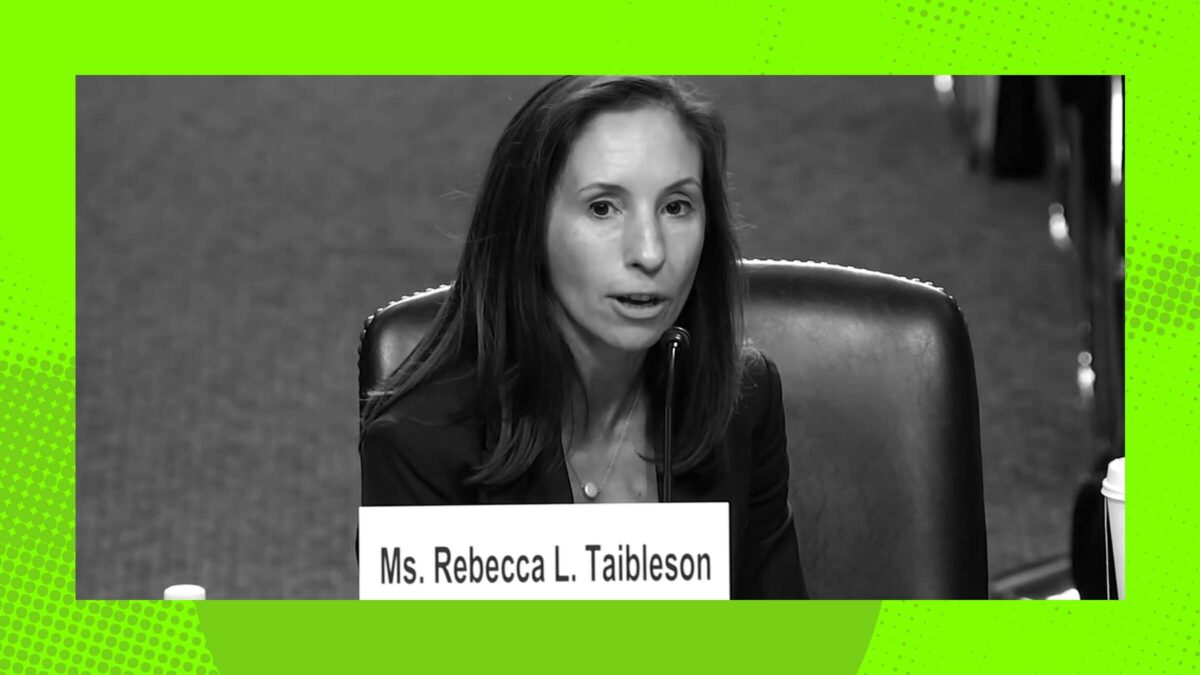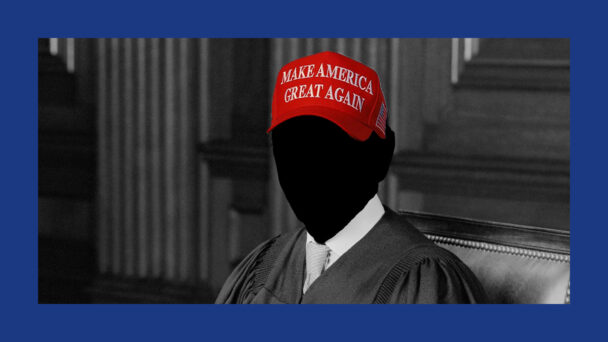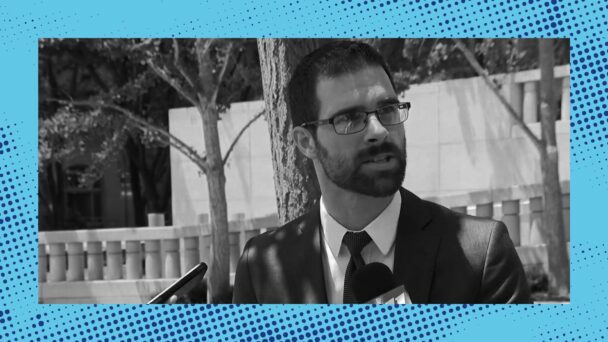On Wednesday, the Senate Judiciary Committee held a confirmation hearing for Rebecca Taibleson, President Donald Trump’s pick for a seat on the Seventh Circuit Court of Appeals. Under most Republican presidents, Taibleson’s résumé would make her a shoo-in: clerkships with then-D.C. Circuit Judge Brett Kavanaugh and Justice Antonin Scalia, stints in BigLaw and the Office of the Solicitor General, and a decade and counting as a federal prosecutor in Wisconsin. In 2018, before the various sexual assault allegations against Kavanaugh became public, she was the guest of honor at a Federalist Society event titled “The Judge Kavanaugh I Know.” After the allegations became public, Taibleson and another former Kavanaugh clerk wrote a Fox News op-ed defending him as “one of the most honorable men we have had the privilege to know.”
In other words, Taibleson’s conservative legal movement credentials are strong, and the strongest of any of the five names for the seat put forth by the state’s bipartisan nominating commission, which Republican Senator Ron Johnson and Democratic Senator Tammy Baldwin run together. Since her nomination was announced, Taibleson has earned generous praise from Trump administration insiders, establishment Republican types, conservative pundits, and one terminally online law professor hoping for a nomination of his own someday.
Under Trump, however, Taibleson is considered insufficiently conservative by many of the culture war zealots whose ideas are alarmingly influential in the right-wing ecosystem these days. Her offenses, as set forth in a joint statement this week signed by an assortment of think tank gremlins, include donations to former West Virginia Democratic Senator Joe Manchin and to the Milwaukee Jewish Federation, a nonprofit that participates in programming for LGBTQ Jews in the area. They also fault her for not quitting the Solicitor General’s office immediately after Trump’s election loss in 2020, and for having the gall, as a law student, to spend a summer interning at the Department of Justice back when Barack Obama was president.
“There is no evidence Taibleson is bold or fearless, battle tested or strong on the issues,” Townhall columnist Ken Blackwell wrote earlier this week. “Instead, the evidence suggests she is a weak pick in an important circuit with serious national consequences.”
Taibleson’s performance on Wednesday should assuage these concerns. Like many Trump nominees, she pointedly declined to treat Obergefell v. Hodges or Griswold v. Connecticut, the Supreme Court cases that protect the constitutional rights to same-sex marriage and to married couples’ access to contraceptives, as “correctly decided” or “settled law.” In doing so, Taibleson made sure to align herself with the conservative legal movement’s ongoing efforts to persuade the Court to overturn these cases—a result that would allow Republican lawmakers to resume their wars on LGBTQ equality and reproductive autonomy, without being subject to the same annoying legal constraints.
During his time for questioning, Connecticut Senator Richard Blumenthal asked Taibleson whether Brown v. Board of Education, the 1954 Supreme Court case that declared school segregation unconstitutional, and Loving v. Virginia, the 1967 case that struck down state-level bans on interracial marriage, were “correctly decided.” Taibleson had little trouble answering: Although she asserted that lower court nominees should generally refrain from grading the justices’ work, Brown and Loving, she said, are exceptions to the rule—“monumental and foundational” Supreme Court decisions, she said, that “many judicial nominees” have publicly recognized as “correct.”
Taibleson was less confident in her response to Blumenthal’s next question, though, about whether the Court decided Obergefell correctly. Instead, she rattled off a summary of the holding, and said that she would “faithfully apply” it as precedent, but could not give it a “thumbs up or a thumbs down.” When Blumenthal asked about the notable gap between her enthusiasm for Brown and Loving and her more lawyerly characterization of Obergefell, Taibleson explained that she was “simply following the recognized examples” of the two “monumental” and “solid” cases that even Republican nominees feel comfortable explicitly endorsing.
Clip via SJC/YouTube
Taibleson offered the same line in response to Blumenthal’s follow-up about Griswold, the contraceptives access case from 1965: She would not say that it was “correctly decided,” but only promised to “faithfully follow” it, along with “every binding Supreme Court precedent.”
I concede that it might not feel like there is much of a difference between a nominee calling a case “correctly decided,” and a nominee pledging to “faithfully follow precedent.” But the problem with the distinction Taibleson draws is that there is an entire body of law about the circumstances in which it is purportedly okay—necessary, even—for judges to overturn precedent, rather than uphold it. Plessy v. Ferguson and Pace v. Alabama, the cases that upheld “separate but equal” and affirmed the constitutionality of anti-miscegenation laws, were at one point “binding” precedent, too, until the Court that decided in Brown and Loving decided that they were not. The justices who decided Dobbs v. Jackson Women’s Health Organization, which overturned Roe v. Wade, would tell you that they did so “correctly,” in that they faithfully applied the test for determining when a precedent with which they disagree is no longer entitled to their deference.
This is not a hypothetical: During his confirmation hearings in 2018, Kavanaugh described Roe as “settled as a precedent of the Supreme Court” and “entitled to respect under principles of stare decisis,” but stopped short of characterizing it as “settled law.” When Kavanaugh joined the Dobbs majority four years later, he wrote a concurring opinion to explain himself: Stare decisis is “not absolute,” he said, and by overruling Roe, the Court was not implementing its own policy agenda, but acting according to its “longstanding stare decisis principles.” The fact that Taibleson is now parroting this language to describe Obergefell does not suggest that she takes the case or the right it protects especially seriously.
If there were any remaining doubts about the purposefulness of Taibleson’s answers, she laid them to rest in an exchange with Missouri Republican Senator Josh Hawley, who asked if she recognized Dobbs as “controlling precedent.” At first, Taibleson echoed her responses about Obergefell and Griswold, saying that she would “faithfully follow” Dobbs. But when Hawley pressed, asking whether she considers the three-year-old Dobbs decision to be “controlling precedent and settled law,” she said yes—a degree of certainty she could not muster when Blumenthal asked her about cases that the Court had decided seven and 60 years earlier.
Taibleson is just one of many Trump nominees to thread this particular rhetorical needle. On September 3, also under questioning from Blumenthal, five district court nominees heartily agreed that Brown and Loving were “correctly decided,” but pivoted to the “binding precedent” and “faithfully apply” language when asked about Obergefell. In July, Eric Tung, a Ninth Circuit nominee who had no problem casting aspersions on Obergefell when speaking at a recent Federalist Society event, would only say that the Court had “granted” a constitutional right to same-sex marriage—a dog whistle that the activists who consider Obergefell to be a heinous act of liberal judicial activism understood loud and clear.
During her back-and-forth with Blumenthal, Taibleson repeatedly appealed to her obligation not to opine on Supreme Court decisions that do not qualify as “monumental.” But as Blumenthal put it, “There are a lot of folks who would feel that Obergefell is a ‘monumental’ decision, too.” Especially for her conservative skeptics, Taibleson’s careful answers reveal how Trump’s nominees are expected to treat Obergefell and Griswold relative to other Supreme Court precedents: She is making clear that she does not necessarily consider the underlying legal questions to be settled—and, by implication, that the conservative crusade to overturn these cases is entirely legitimate, and maybe even welcome.




